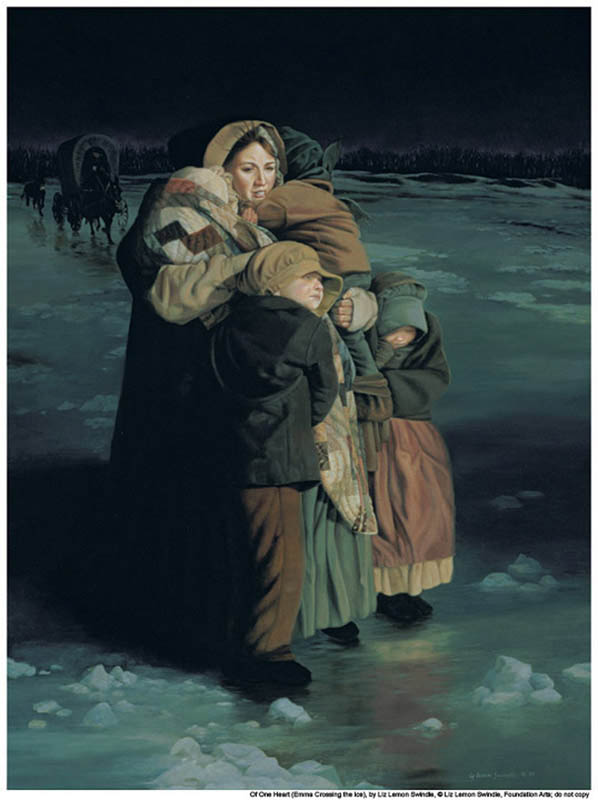Speak truth, work hard, live an honest life, and share earnings with those in need.- From the Sikh Rehat Maryada, the Sikh code of conduct

This is the carved dais that is the only furniture in the room. It is visually stunning.
Walking into the Baisakhi Philadelphia Sikh Society, I am immediately impressed with the stunning beauty of the women. From the youngest to the eldest, they are clothed like exotic flowers in vivid colors and intricate beadwork. I feel a bit bland and uninspiring as I take off my shoes in the communal entry way and adjust the headscarf they requested each of us to wear during our visit.
Empty of all furniture, except a carved wooden dais, with yet more gorgeously vibrant fabric, each of us chose a spot to sit on the carpeted floor. There was some time before the presentation began, so I asked Raj, one of our hosts, to explain the purpose of the dais. She graciously explains that their sacred writings of the gurus (Sri Guru Granth Sahib) are kept on the dais.
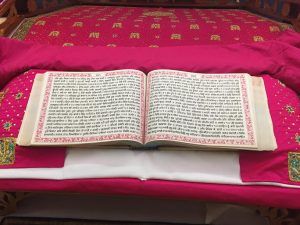
The Book of the Ten Gurus, Sri Guru Granth Sahib. It sits on the Dais.
The Granth is symbolically raised higher than everyone, reminding them that all are equal before the law of God. The Granth is kept covered with beautiful fabrics to keep it protected. Throughout the service, a Chaur Sahib is used to fan the Granth as a sign of reverence and respect for the scriptures, similar to how servants would fan a great ruler or pharaoh.
Our hosts begin by explaining some of their clothing and its meaning to us. Most Sikh men and women keep their uncut hair covered, men with turbans, and women with headscarves. Sikhs also wear wooden combs in their hair, special cotton underwear, and a ceremonial sword (small, like a dagger) called a Kirpan.
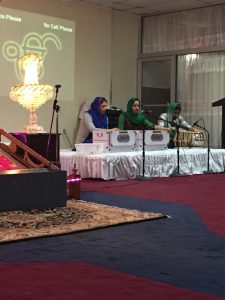
Harmonium and Jori accompany beautiful traditional songs.
The Kirpah represents the fight against injustice. Mormons are often asked about the sacred garments we wear, so finding out that Sikhs also wear symbolic clothing made me realize, again, how much we share in common as followers in faith. I like most about their ceremonial clothing the steel bracelets worn on their right wrist—to remind them to live life with integrity and strength.
As the presentation continues, two of the women play Harmonia, which look like keyboards mixed with accordions. A third woman plays two Jori, and all of the women undulate their voices in traditional song. There is an ethereal beauty in the music that is very unfamiliar to my American ears.
Throughout the meeting, men, women, and children come before the dais to kneel and place their foreheads on the floor in respect, often leaving money in the box in front of the dais. All monies collected are used to feed the hungry. Sikhs believe that if you are physically hungry, you cannot hear scripture. Religion should be available to all, so all should be fed when hungry.
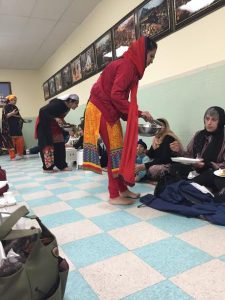
The women were brightly dressed. And we learned that Sikhs have symbolic clothing.
Sikhs are an optimistic, positive people who believe in living by three basic tenets:
Naam Japna Remember God at all times.
Kirat Karna Commit to earning an honest living without exploitation or fraud.
Vand Chakkna Charity and service to all.
We learn that Sikhs seek to avoid the five vices which lead people to be self-centered and create barriers between ourselves and God. If a person can overcome these five vices, they are on the path to liberation.
- Kam– Lust
- Krodh– Anger
- Lobh– Greed
- Moh– Worldly Attachment
- Ahankar– Pride/Ego
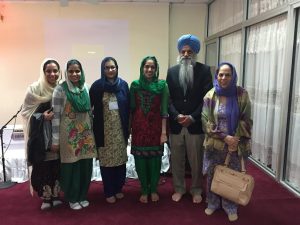
Tanpreet, Raj, Ashwinder, Harbir, Karaj, and Manjit teach us about the Sikh faith.
Sikhs rise in the morning and straightway take a shower, before putting on clean and fresh clothing. Then they meditate before going to the Sikh center for prayers. There are set prayers, morning and night, which we are invited to participate in, if we wish.
Sikhs greatly respect women, believing that ‘from woman come all kings’. I find it fascinating to watch the women speak freely and sing freely. In my mind, I had falsely assumed that turbaned men and women with their heads covered meant that women would be subservient to the men. I find this to be completely untrue as the women are clearly given an equal voice and are treated with deference.

After the service they served a wonderful dinner.
When a person chooses to follow the Sikh faith, they gain a new last name:
For a woman, it is Kaur, meaning Princess, thereby giving women value and respect.
For a man, it is Singh, meaning Lion.
This is done to eliminate discrimination based upon a person’s family name and reinforces that all humans are equal before God.
Sikhs are great believers in interfaith diversity. For a Sikh, it is less important what religion you are, than that you are a good follower of that religion. Are you a Hindu? Be a good Hindu. Are you a Muslim? Be a good Muslim. Are you a Mormon? Be a good Mormon.

The food was plentiful and delicious!
Following the teachings about Sikh history and religion, we are led to an open room with carpets laid out and invited to sit. As we do so, we are served delicious foods! A word of warning, if they warn you something is spicy, it is VERY spicy! I’m not sure what was in the vegetarian green sauce, but I am very grateful for the yogurt to cool down my mouth!
Another word of caution, you will be offered more wonderful food than you can possibly eat and you will not want to stop eating because it is so delicious!
All are welcome to visit a Sikh Godura, they are open 365 days a year. After such a gracious and warm visit, I am planning to bring my children to experience and learn from this incredible faith.



